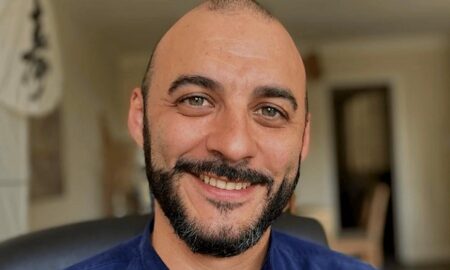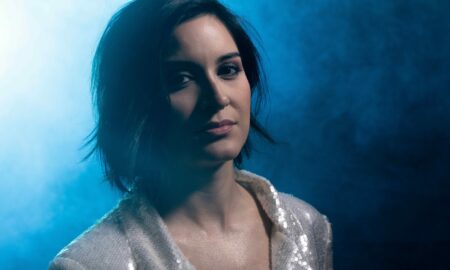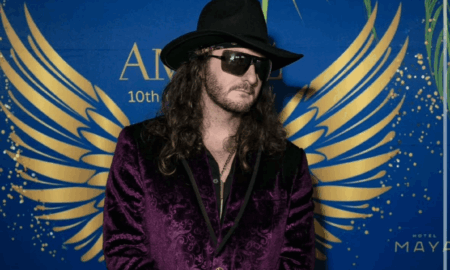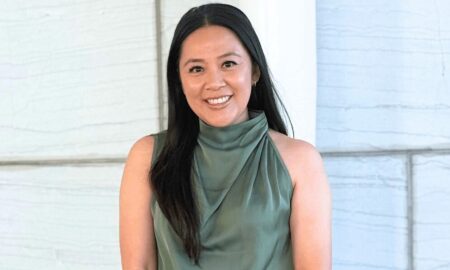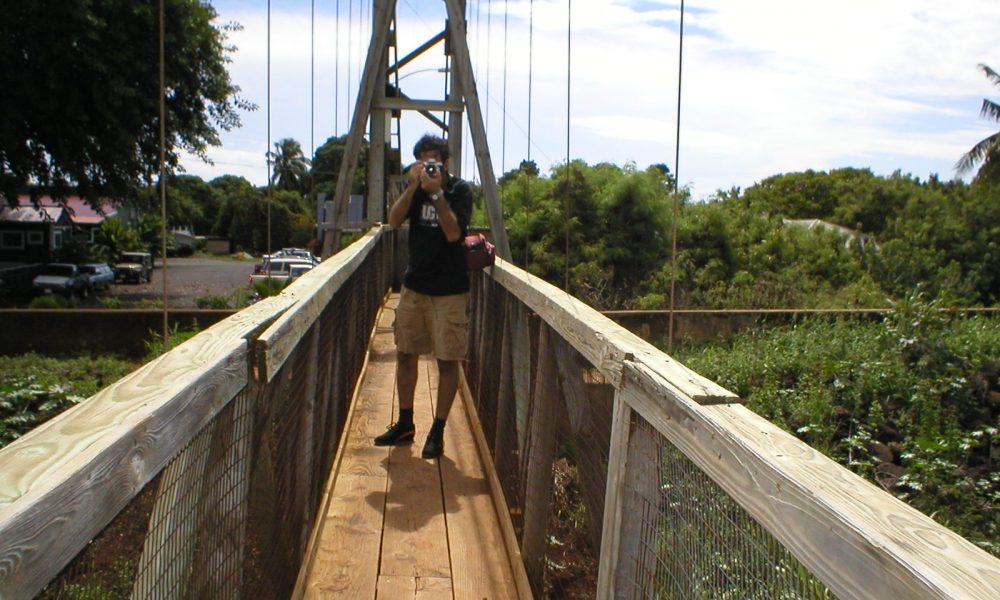

Today we’d like to introduce you to Emre Korkmaz.
Emre, please share your story with us. How did you get to where you are today?
I was born and spent my formative years in the vibrant European side of Istanbul, Turkey. My parents divorced when I was a little boy and without siblings and playmates, I quickly learned that my imagination can be my best friend. If I try to paint a picture of my childhood days: Long, dimly lit hallway of our apartment, the rich patterns of Iranian carpets and strange emotional aura of our mid-century European furniture gave me enough material to create a “second universe” to dream, which I always preferred over the real world laden with dull rules. I guess I owe my happy childhood to this second universe. I loved reading Jules Verne novels and Tintin comic books, dreaming about faraway lands. But I guess there is no substitution for the experience of a little boy watching his first movie in a dark movie theater. I can’t remember what my first film was, (either a French crime film starring Alain Delon, or a Balkan art-house film), but I remember refusing to leave the theater after the movie and trying to convince my poor grandmother that the movie had not finished yet. We had three movie theater walking distance from our apartment so I watched 2-3 films a week, mostly European and Hollywood films.
A little anecdote from those days: In the elementary school, our favorite game was “movie narration:” one of us stood there in front of the others and narrated a movie. When we run out of movies I would make one up and narrate on the spot and none of my friends seemed to mind. I am talking about the entire story of a non-existing movie that takes 10-15 minutes to tell! I wish I could do that today, making up a complete story as I am telling it for the first time.
When I was selected to play the leading role of a successful high school play, I had the chance to discover the backstage where these second universes are created. We had an intense character study conducted under the tutelage of Turkish National TV’s acting coaches during the year-long rehearsals, but with its long waiting periods and repetition of same lines and actions over and over, the process felt more like real life rather than the dream world. But when we begin staging it in front of the audience, I felt the power of the text as I had different reactions for my lines and actions every week. When teary-eyed mothers hugged me after each show, I knew that they were hugging not me, but the character the writer created in a room alone—I deeply felt the magic of this second universe.
I decided to be an actor not because it would give me an easy gateway to a second universe, but I liked the small fame it brought. The character I portrayed was a young Turkish poet stricken by poverty during WW2. I loved how everything was an inspiration for a poem for him, but I also understood his family exasperated by what they saw as his escape from the seriousness of life: The time and place wrong to be a poem.
Time and place also seemed to be wrong for me. My teachers stubbed out their cigarettes and dismissed me: “all theater actors are struggling to pay their rent; you would have a miserable life, study something useful so you can find a real job.” They were not entirely wrong. So I chose to play it safe and went to business school. I joined a big international American corporation in my third year and received a handsome salary and full benefits even before I graduated. With my “American Dream Paycheck” and crowd of friends, I traveled around Europe, took vacations in the Aegean Islands, and drank only specialty wines in expensive restaurants. My work, though, was mind-numbingly boring; I quickly specialized because I did the same tasks every day. I became a small gearwheel in a big machine in this Kafkaesque environment of cubicles.
In those dull years, I tried to fill the gaps with a radio program, literature, European, Asian and American cinema, and photography courses. As a student, I created a themed-music radio play, “Emre’s Street.” It aired late at night on a small local radio and featured characters from an imaginary neighborhood living in an undefined past. Far from the coldness of Turkey’s increasing modernization, a local grocer, butcher, and greengrocer interacted with their customers with the warmth of old times and sometimes broke out into half-remembered songs. When I worked in the big corporation, I found a new means of narration: photography. As a member of the IFSAK- (Istanbul Amateur Cinema and Photographers Association,) I walked the narrow streets of Istanbul, capturing neglected gray Ottoman Mosques and old men with bent heads carrying black plastic shopping bags under the prominent bright red Coca-Cola and saturated blue Parliament billboards. Those days were good-old 35mm analog days so I got the chance to experience the unique feeling each lens can create before we all go under the unifying power of digital cameras’ small-sensors.
Nothing, however, remedied the “not-doing-anything feeling” generated by the insipidity of my creative life. I was young and enthusiastic: “What sort of life can I have if I always stay safe and take no risks?” I asked myself. Cinema offered me a path to creating a complete second universe, one played out in a dark room in which people could experience “the realities” of human lives. Cinema was worth dedicating my life to, but there were no evening cinema courses that I can take at that time and going back to school after finding a good job was utterly unheard of in Turkey. I made a mistake by playing it safe, so now I had to do something radical.
When I declared that I was planning to quit my job and study filmmaking in the US, people – with the full weight of the word – were shocked. “Are you aware of what are you leaving behind? You don’t know anybody in America; you don’t even speak English!” Today, I look back and feel compassion for that young man. How could he be that brave? I don’t want to over-simplify the motivations lying behind his decision. Perhaps unproductive idleness bothered the modernist inside him; perhaps the close-knit community of Istanbul suffocated him; perhaps his decision was a pure “will to power.” But he had no idea how difficult it was going to be in the US.
On the first day of the year 2000, I arrived in San Francisco Bay Area. For the first time in my life, I experienced the loneliness with the full weight of the word. Yes, I have arrived at the “center” but it didn’t feel like the advertising billboards and American movies of my childhood. On the other hand, however, I experienced a special kind of freedom that I have never known before: whatever I said I wanted to do seemed possible in this new place. In my accented, broken English, I said “I want to make movies” to my school advisor. “How interesting! What kind?” she replied, and she talked about film schools in California with a childlike optimism. To me, “American freedom” is this optimism.
I guessed once again I chose to play it safe by studying the Web-Multimedia design at CSU in order to support myself while improving my English in preparation for cinema school. But as soon as I graduated, the dot.com bubble burst and there were no jobs. Running out of money, I ended up delivering pizza in the East Bay and thanks to Oakland Raiders’ excellent season and people ordering pizza while watching games and me wearing a Raiders’ jersey while delivering those pizzas, I saved a lot of money on tips.
When I saved enough, I moved to LA to take film-making courses at UCLA while working as a door-to-door cable TV salesman, and I began working on the movie sets as a production assistant. In 2004, the year I got married, I bought cameras and lighting equipment and started a video production company. In about a year, I worked hard to build an effective reel for weddings and corporate videos, keep taking filmmaking classes, write articles for an independent cinema/art Turkish magazine as a freelancer, and work as a boom operator in several movies. Unlike the other crew members, I would stay where I was after the director yelled “cut!” I remained behind as the fly on the wall; I listened to the director and actor’s intimate conversations. Also, I had a chance to think about the stories only in terms of sound: what can you do with the sound that you cannot with pictures?
During this period, I met a writer-producer with whom I struck a chord. I read his script and immediately identified with the main character’s “outsider” feeling living in East LA. We made the micro-budget narrative feature together with the help of his family and friends. The Last Musketeer is about a family’s struggle with alcoholism and it was the official selection for 17 festivals and received awards from four of them.
It was my time to write my own screenplays so I wanted to take some screenwriting courses, and with my wife’s encouragements, I applied graduate schools and was fortunate to be accepted into some of the world’s most distinguished film schools: AFI, Chapman, UCLA, and USC. After rigorous research, I opted for USC’s School of Cinematic Arts. Obviously, it was intimidating to go such a school as I was expecting to meet people who smoke Gauloises and talk about existentialist philosophy but what I found was very in tune with the traditional American down-to-earthness I admired and embraced since I arrived: work hard and keep your head down. I’ve met highly talented people and had a chance to work with Academy Award Nominated filmmakers and show-runners of highly successful TV series.
I loved what they called “writer’s life,” that stubbornness of going to that desk, that library corner, that cheap hotel room and write and rewrite the same thing over and over, completely disconnected from the real life. And sometimes, at rare moments, when you like what you write, even a little bit — there is no feeling in this world similar to those moments. When my stories resonated with the other students in ways I never intended or thought of, I realized that my classmates now knew something about me and my culture in a very intimate way, one that could not be achieved by any other means of communication. I think this is one of the best gifts fiction can offer to its writers and readers: however unique, stupid, brilliant or silly you and your experiences are, there are people out there just like you, going through similar troubles. This humbles us: we feel that we are not alone and can all understand each other and this world is a warm place. I completed my MFA degree with my thesis script, Soccer Days, which received the school’s prestigious “Honor of Distinction” award.
Completing a Master’s degree in writing in another language other than my mother tongue made me feel little puffed up, I can’t deny that, but when I graduated, however, I faced an entirely different environment, one they called the “real world” and “the industry” gave me a reality check. As I found myself spending most of my time preparing for meetings that will take place some upper floors of wealthy skyscrapers, or worrying about phone calls or news that never come, I slowly realized I am nothing more than a speck of dust in this town. How cheerful and positive everything is delayed me to deeply understand how difficult it is to get a film, even a small film, made — my utter lack of talent on something called networking didn’t help. Once again, formidable corporate buildings grayed the air, but this time I have to coexist with them without losing sight of that little kid who was born in Istanbul and liked to dream.
In an effort to keep in touch with that kid, I often visit Istanbul and walk its lively and colorful streets, which led me to a documentary project. In one of those walks, I saw the increasing number of young African kids peddling wristwatches and sunglasses on the streets. As I talked with them, I learned that they all came to Istanbul with the dream of being professional soccer players, that their families spend all their savings on the over-promising rogue agents who abandoned them as soon as they arrive in Istanbul. All of these kids feel ashamed to go back to their country as a failure. Of course, their stories hit a soft spot in my heart as another dreamer who had gone to faraway lands, and I couldn’t help but making a documentary about their experience. “Letter from Teejay” follows such a young soccer player in Istanbul, and it still plays in festivals.
I recently completed a feature film that I wrote and directed. I have been living in California for about 20 years now and a large part of what makes me who I am is Californian, though my childhood and youth in Istanbul are just by my side, a thought away. These identity dynamics have always interested me; it is very common in California, and every person experiences it in his / her way. My feature film, Winter in LA, deals with a multicultural LA couple who wrestles with their identity. As their marriage falls apart, they navigate their way through immigration and other lovers, but they strangely gravitate back towards each other because of their shared experiences. Aside from sunshine and palm trees, Winter in LA takes place on the fringes of the city by the train tracks during a cloudy winter. Tonally, I tried to emulate what Chekov did in his short stories: my deeply longing characters deal with aging and the fact that their dreams are slowly moving away from them. It is in post-production now and I hope it will be an interesting addition to a large number of film that takes place in LA.
I am also currently working on a documentary project. Gestation of this film began with a romantic, but a bit sad story: years and years ago, two of my close friends were deeply in love with each other and planning to get married, but they broke up a few months before the wedding. Let me call them “the boy” and “the girl” for the sake of the story. Now the boy, married to someone else, lives in a coastal town in the south of Turkey, whereas the girl still remains in Istanbul’s dating scene. Some years ago, I had to visit that coastal town for some other reason and went to see the boy. As I knew I would visit the girl later in Istanbul, I took the boy’s pictures to tease the girl because I knew she still had some feeling for the boy. When I visited the girl in Istanbul, I took my time talking about the boy’s new life, the assertive character of his wife, their house overlooking the Greek islands, their large and extremely friendly dog, slowly teasing her with every bit of information. And I finally asked her “would you like to see his pictures?” “Yes!” she said. As she went through the pictures on my phone, she swiped to arrive at the video I took of the boy and played it. Through the pictures she was fine, but with the video, when she heard him talk and pet his dog, her eyes got little misty.
The takeaway of the story can be “ability to deeply love,” or “staying in the past” or Chekhovian “shattered dreams” or Faulknerian “past is never dead, it is not even past” — you can pick any one of these or come up with your own, but what strike me most was the surpassing power of the video over the pictures. The same phone, same lighting, same angle, same everything, but the video’s effect on her was a lot more powerful than the still pictures. Yes, video has movements, sound; it gives us more, and nowadays we have video cameras in our pocket, as well as 360 and VR capable phones, but photography is still very relevant today; billions of pictures are taken and shared every day. What makes photography the thriving medium? Why we go back to wedding pictures, but rarely watch the wedding video?
Without even planning, I found myself deep in a research about the topic, which I later realized called medium specificity. At some point in my research, I felt the urge to speak with artists who employ photography as well as other mediums and that point I decided that this should be a documentary. I interviewed artists based in London, Berlin, Stockholm and New York: besides being a photographer, some work in fine art, some work in 360-VR, some in personal photojournalism,—we talked about what they can do with photography that they cannot do with other mediums. I will be interviewing one more artist in San Francisco and then begin post-production of the film.
Has it been a smooth road?
Many bumps as I mentioned above. It was particularly tough when I ran out of money in San Francisco, or when I felt that the stories I want to tell is not particularly profitable for the Hollywood industry. At hard times like this, I have a little trick to console myself: I read my favorite writers. Gustave Flaubert writes in his letter to his mother from Istanbul: “You can depict wine, love, women and glory on the condition that you are not a drunkard, a lover, a husband or a private in the ranks. If you participate actively in life, you don’t see it clearly: you suffer from it too much or enjoy it too much.” So I play this little game that, if I call myself a writer, I must have this “second universe,” therefore I can only be an observer of real life, not a participant. This notion comes with a heaven-sent luxury of not taking life so seriously. Also, at those special moments when I realize your stories touched someone’s heart, you find the power to plow through and take even more risks.
How do you think the industry will change over the next decade?
There is so much content out there and people have only a few hours a day to watch them. In the feature, there will be even more content available to watch and the audience will have less time for them. “The curators” will define the feature. The audience will look more and more for a specific curation of the available content for their specific taste. I think VR and 360 will be used for delivering specific experiences rather than telling stories.
Contact Info:
- Website: www.emrekorkmaz.com
- Instagram: @auhasardemre
- Twitter: @auhasardemre






Image Credit:
My wife and Tish Crawford.
Suggest a story: VoyageLA is built on recommendations from the community; it’s how we uncover hidden gems, so if you or someone you know deserves recognition please let us know here.














